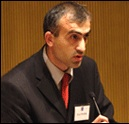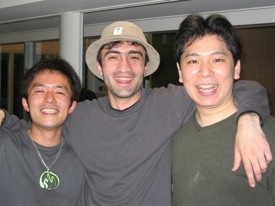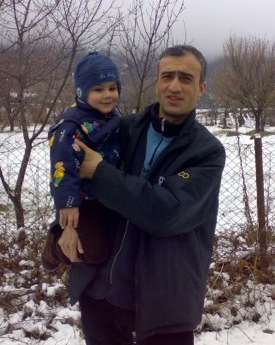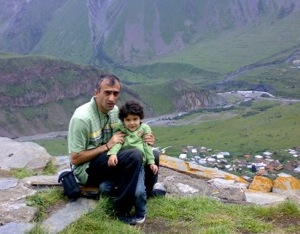 Zaza Chelidza, Georgia
Zaza Chelidza, Georgia
Deputy Minister, Ministry of Finance
Public Finance Program (’02/’03)
What is your area of specialization and how did you come to work in this area?
I am currently working as a Deputy Minister of Finance of Georgia. In this capacity, I am responsible for tax and customs legislation and methodology, macro and fiscal forecasting. Over the past ten years I have been actively involved in the policymaking process in Georgia. I worked for the parliament of Georgia, the President’s Office, the National Bank of Georgia and as a Deputy Minister of Economic Development. The experience gained in those positions greatly contributed to my professional development.
You are currently Deputy Minister of the Ministry of Finance. In this capacity, what do you see as the main opportunities and challenges for Georgia over the course of the next five to ten years?
After the collapse of the Soviet Union and the announcement of independence, the main concern of Georgia remains to be its territorial integrity. Abkhazia and South Ossetia, two strategically located regions that are historically Georgian territory, are occupied by Russia. This is causing a lot of problems and conflict and is the most significant political challenge of my country.
Georgia is not rich in natural resources like oil, gas or minerals etc. If we look at the composition of GDP by sectors, almost all sectors have an equal share in GDP. Georgia is a small open economy country and as many other developing countries mostly depends on FDIs and private capital inflows which makes our country vulnerable to external shocks. On the other hand, its geographical location allows Georgia to have leading transit functions in the region.
Since the Rose Revolution of 2003, commitment of Government of Georgia has been to pursue very strong reforms. Such as: • Establishing rule of law;
• Establishing rule of law;
• Fighting corruption;
• Reforming public sector;
• Adoption of new tax code;
• Reduction of tax burden;
• Deep liberalization including trade liberalization;
• Deregulation of economy;
• Infrastructure rehabilitation;
• Increasing FDI inflows
• Strong GDP growth;
• Strong portfolio inflows;
• Aggressive reforms of the financial services sector;
• Establishment of free industrial zones.
Future challenges for Georgia could be classified as a political and economic. The main challenges remain the restoration of economic growth and ensuring political stability. In general, political challenges are: resolving territorial integrity, EU integration, joining the NATO, strengthening strategic transit functions as a crossroad between Europe and Asia, The future economic reforms should be focused on the following: further reducing the tax burden over the next 4-5 years, further developing Georgia’s infrastructure in order to increase efficiency in the economy and attract investment, reducing barriers to entry and encouraging institutional de-regulation of the economy.
What was the most important thing you learned while at GRIPS? And how has your time in Japan influenced you in your subsequent career?
The master’s degree in public finance from GRIPS highly contributed to my career. One year intensive study at GRIPS and nine-month practicum in Japanese Tax Administration gave me broad knowledge and practical skills. While working towards my master’s degree I tried to show reasons for failure of fiscal policy implementation of Georgian Government and reveal weaknesses of Georgian tax administration during the first years of transition. I would particularly like to mention the lectures delivered by highly qualified professionals Takashi Fukushima and Kenichi Ohno.
 During your career in the Georgian government and administration, what achievement(s) are you most proud of and what has been the most rewarding aspect of your career thus far?
During your career in the Georgian government and administration, what achievement(s) are you most proud of and what has been the most rewarding aspect of your career thus far?
While being Deputy Minister of Economic Development of Georgia in 2005-06, I was directly involved and partially supervising economic reforms. This was an extremely challenging task but also rewarding as you can gradually see the results. Some examples of the reforms included:
– Deregulation reform – easing administrative procedures, reducing number of licenses and permits, introduction of “one stop shop” for business;
– Technical regulation reform – reforming standardization, metrology and accreditation;
– Trade liberalization reform – I was a speaker for submission of the draft law on “Customs Tax” to the Parliament. This was a “revolutionary package” for Georgian economy – liberalizing trade
Did, the perhaps more lucrative, private sector ever hold any appeal for you?
I have no experience of working in private sector. I think if you hold an important position and have high responsibilities, it does not matter whether you work in a private sector or in public – you always carry immense responsibilities. Of course, private business is an opportunity – you manage your private finance and property. Sometimes it seems attractive, but doing job for public sector gives you other challenges. You manage public finance and property.
If you could choose another profession to be in, what would it be?
Frankly speaking I have never imagined myself in any other profession.
What is your fondest memory of your time spent in Japan?
Traveling to Kyoto was an unforgettable experience. The days spent in that unique city will always be remembered and I hope some day I will have a chance to visit Kyoto once again.

What do you miss about Japan?
Too many things – first of all, the wonderful people I was lucky to meet, my friends, professors. I miss outstanding Japanese cuisine and vibrant Tokyo night life.
What is your favorite thing to do when you are not working?
I always enjoy spending my free time with my family.
How do you maintain a balance between your work and the rest of your life?
It is really difficult to have a balance, especially when holding a senior position. I try to take advantage of the weekends.
What advice would you give to current GRIPS students?
I would like to encourage all current GRIPS students to derive maximum benefit from the study program, to obtain the invaluable information and skills, to form friendship and share all these with the colleagues and coworkers in their native countries. I believe the experience and knowledge acquired at GRIPS is a brilliant asset for making a good career progress.





